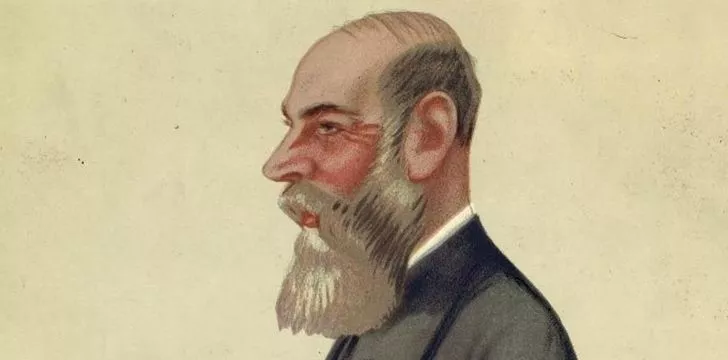The term “boycott” appears to have no linguistic connection to other words.
Today, people boycott events or places for various reasons. Sports events, television shows, movies, and political rallies are just a few examples of things that are boycotted on a regular basis.
However, the word “boycott” is somewhat unusual when you stop to think about it. How does the term relate to the act of not attending or participating in something? How does it relate to isolating or ignoring something?
Furthermore, the word “boycott” doesn’t seem to have any linguistic similarities to other words. So, where did the term come from? Let’s take a trip back to 1880 to find out.
The Story of Captain Charles Boycott

In the late 1800s, during the “Land War” in Ireland, a British captain named Charles Boycott served as the land agent for a landlord named Lord Erne in County Mayo.
After a year of poor harvests in 1880, Lord Erne offered his tenants a 10% reduction in rent, which they deemed insufficient. They demanded a 25% reduction instead.
Lord Erne refused, and sent Boycott to evict the protesting tenants. At this time, a member of the Irish Land League named Charles Stewart Parnell suggested peaceful social ostracism rather than violence as a means of dealing with landlords and their agents.
Parnell proposed that the local community should simply ignore the offender and conduct no business with them.
The Boycott of Boycott

Soon after Boycott’s eviction drive began, he found himself ostracized by the local community. His workers stopped working in his fields, stables, and house, and local businessmen refused to trade with him. Even the local postman refused to deliver his mail!
Boycott was facing financial ruin as nobody would harvest his crops. Eventually, he hired 50 men from other areas to come and harvest them and paid for an escort of 1000 armed policemen and soldiers to bring them to his estate.
However, no violent action was taken against Boycott or his workers due to the Irish Land League’s promise of nonviolence. The cost of protecting Boycott’s harvesters was far greater than the harvest’s value, leaving him in dire financial straits.
After the harvest, the boycott of Boycott continued successfully.
Going Viral in the Olden Days

The press quickly picked up on the boycott, and within weeks, Boycott’s name was everywhere. James Redpath of the New York Tribune was the first to use the term in the international press, and The Times used it to describe organized isolation in November of 1880.
The term “boycott” started being used figuratively by 1881, with an article in The Spectator describing how London was “boycotted from Kew to Mile End” by nature. Within a year of the boycott on Boycott, the word had become widely used in the English language. It’s interesting how the word and the act of boycotting have remained true to their origins over the years. Don’t forget to share the origin of the word with your friends next time they mention it!
FAQ
1. What does the word “boycott” mean?
The word “boycott” means to refuse to buy, use or participate in something as a form of protest or punishment.
2. Where did the word “boycott” come from?
The word “boycott” comes from the name of an Irish land agent named Charles Boycott, who was ostracized by his community during the Land War of the 1880s. His name became synonymous with the practice of refusing to deal with someone as a means of protest.
3. When was the term “boycott” first used?
The term “boycott” was first used in the British press in 1880 to describe the ostracism of Charles Boycott.
4. Was the practice of boycotting common before the term was coined?
Yes, the practice of boycotting has been used throughout history as a means of protest and social pressure. For example, the Boston Tea Party in 1773 was a form of boycott against British taxation.
5. What impact did the use of the word “boycott” have on the practice of boycotting?
The use of the word “boycott” helped to popularize the practice and gave it a name. It also made it easier for people to discuss and organize boycotts.
6. How has the practice of boycotting evolved over time?
The practice of boycotting has evolved over time to become a common tool of social and political activism. It is now used to protest a wide range of issues, from human rights abuses to environmental destruction.
7. Have there been any famous boycotts in history?
Yes, there have been many famous boycotts throughout history. Some examples include the Montgomery Bus Boycott during the Civil Rights Movement, the boycott of South African goods during apartheid, and the current boycott of Israeli products in protest of the country’s treatment of Palestinians.
8. What are some other words that are commonly used in conjunction with “boycott”?
Some other words that are commonly used in conjunction with “boycott” include “protest,” “divestment,” and “sanctions.”
9. Do boycotts actually work?
Boycotts can be effective in bringing attention to an issue and putting pressure on those in power to make changes. However, their success depends on a variety of factors, including the size and scope of the boycott, the level of public support, and the responsiveness of the targets of the boycott.

Zayn Anderson is a prolific writer with a passion for uncovering the world’s intriguing facts. Armed with an insatiable curiosity, he delves into various subjects, from history and science to nature and technology.
